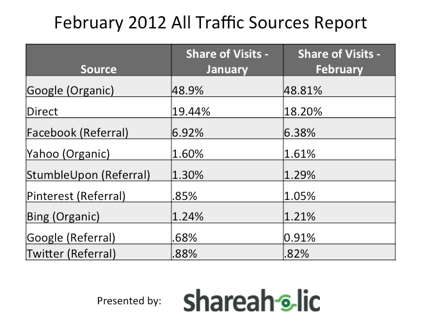Why Traffic Sources Matters
A brand’s traffic source directly correlates with its health
and position across a variety of channels. For starters, referral traffic (a
traffic source from another site) and direct traffic (URLs typed or bookmarked
which visitors use directly to your site) have are two indicators of how a
specified campaign or how much organic reach a brand has.
As Kaushik puts it, “Direct traffic contains visitors that
proactively seek you out, everyone else you have to ‘beg’ to show up on your
site!” (Kaushik, 2010). He makes a
strong point in that people who directly visit your site are:
- People who are your existing customers or past customers and have bookmarked your site
- People who are familiar with your brand
- People driven by WOM (Word of Mouth)
- People driven by offline campaigns (TV ads, OOH ads, etc.) and typed the URL directly
In other words, we want direct traffic because these people
make up some of the strongest brand influencers who were motivated to visit
your site directly over other competitors.
But let’s not forget about referral traffic. This, too, is
an important part analytics. Referral traffic is a measurement of how a brand’s
efforts are being voiced across third party sites. Users will come across some
form of content, click on it and visit a brand’s site.
According to B2C, Referral
traffic accounts for almost 70% of all traffic for blogger Andrew Glasscock.
He goes onto say that each of your top
referrers can potentially be tapped for better referrals and higher traffic
counts. “If you receive a lot of traffic from Google, perhaps you should
advertise with their services and boost those numbers.”
Where Search and Social Come Into Play
Search is still, and will probably always be, the number one
reason why people interact with the Internet. Having the right mix of SEO
techniques and paid advertising campaigns is important in creating a consistent
flow of search traffic. None of this is possible without attaining high
rankings on a mix of keywords.
GA’s search traffic tool identifies what keywords people are
using most to visit a brand’s website. This information can be helpful in
identifying how best to increase reach on those keywords while identifying
areas of opportunity on keywords a brand wants to be known for.
The goal of Google, and all search engines for that matter,
has been to deliver the most helpful and relevant information to users.
According to Martin Wong, “Google’s success came from taking an approach that
was radical in those early days: to curate for content
quality by measuring the number of links to a page” (Wong, 2012). In other
words, the more inbound links a page received, the greater their authority.
This leads to a page having stronger content. Social media, however, evolves
that mindset by incorporating social media into the mix. Tweets, Facebook likes
and +1 vote are factors of how a page will rank against its competitors.
Considering this and the importance of social, GA has made
social its own traffic source, tracking social interactions and which social
media channels they are coming from. According to Google, “The social web
connects people where they share, critique and interact with content and each
other. Social analytics provides you with the tools to measure the impact of
social.” In other words, there is a high probability that a brand that is
socially active and engaging will generate greater amounts of traffic and rank
higher, over its competitors.
Knowing which social channels your audience interacts with
is key for producing socially-driven campaigns. For example, Pinterest has been
growing in popularity accounting and is now among the top
referral sites, beating out Twitter, YouTube, Google+ and Linkedin (Crook,
2012).
This drives brands to build a Pinterest campaign in order to
drive traffic to their site.
Traffic Sources are Socially Impacts
Referral sources, simply put, are the culmination of all
traffic visiting a brand’s site and knowing where they came from. This allows brands
to identify and develop the right tactics that will lead to goals being met
(lead acquisition, ecommerce transactions, etc.).
With social media having such a strong impact in how people
search for information, Google has made great strides in taking into
consideration the importance social media has.
GA’s latest efforts to push Social into its own referral
source is reason enough to pay attention to how social affects a brand’s reach.
A brand’s social impact directly correlates with: (1) which pages and sources
people engage with; (2) what information is being shared and leads to an
ecommerce transaction, when applicable; (3) measuring what social engagements
are occurring on your website (likes, shares, etc.); (4) and what kind of
traffic patterns are directly related to social.
References:
Crook, J. (2012, March 8). Retrieved from
http://techcrunch.com/2012/03/08/pinterest-now-generates-more-referral-traffic-than-twitter-study/
Glasscock. (2012, June 10). How to gauge your best
referral traffic in google analytics. Retrieved from
http://www.business2community.com/online-marketing/how-to-gauge-your-best-referral-traffic-in-google-analytics-0189880
Kaushik. (2010, September 20). Excellent analytics tip 18
make love to your direct traffic. Retrieved from http://www.kaushik.net/avinash/excellent-web-analytics-tip-analyze-direct-traffic/
Wong, M. (2012, February 29). How social media drives
search results. Retrieved from
http://www.marketingsmartt.com/social_drives_search/
